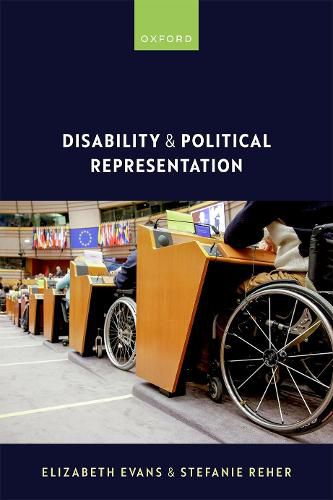Readings Newsletter
Become a Readings Member to make your shopping experience even easier.
Sign in or sign up for free!
You’re not far away from qualifying for FREE standard shipping within Australia
You’ve qualified for FREE standard shipping within Australia
The cart is loading…






Disability and Political Representation explores how disabled people experience the various stages and aspects of the representation process, drawing upon extensive empirical research and a variety of qualitative and quantitative data. It discusses why increasing the number of disabled politicians matters, not only as a matter of justice and equality but also to better represent the issues and interests of importance to disabled people. Evans and Reher identify a variety of ableist barriers prevent disabled people from fully participating in the political process, from disenfranchisement and inaccessible polling stations to prejudice within parties and a lack of financial support for candidates who require adjustments. The work shows that while the preferences of disabled citizens are currently under-represented in parliament, disabled representatives often draw on their lived experience to advocate for their interests. The concept of experiential representation is developed to help scholars and practitioners better navigate the concept of political representation, specifically as it relates to disability. Thus, the book explores how disability can help us think about the contours of political representation. It presents and analyses a range of diverse and original data, including qualitative data generated from interviews with disabled politicians and activists in the UK, quantitative survey data on the political attitudes and participation of disabled citizens from across Europe, and data from survey experiments examining voter perceptions of disabled politicians in the UK and the US.
$9.00 standard shipping within Australia
FREE standard shipping within Australia for orders over $100.00
Express & International shipping calculated at checkout
Disability and Political Representation explores how disabled people experience the various stages and aspects of the representation process, drawing upon extensive empirical research and a variety of qualitative and quantitative data. It discusses why increasing the number of disabled politicians matters, not only as a matter of justice and equality but also to better represent the issues and interests of importance to disabled people. Evans and Reher identify a variety of ableist barriers prevent disabled people from fully participating in the political process, from disenfranchisement and inaccessible polling stations to prejudice within parties and a lack of financial support for candidates who require adjustments. The work shows that while the preferences of disabled citizens are currently under-represented in parliament, disabled representatives often draw on their lived experience to advocate for their interests. The concept of experiential representation is developed to help scholars and practitioners better navigate the concept of political representation, specifically as it relates to disability. Thus, the book explores how disability can help us think about the contours of political representation. It presents and analyses a range of diverse and original data, including qualitative data generated from interviews with disabled politicians and activists in the UK, quantitative survey data on the political attitudes and participation of disabled citizens from across Europe, and data from survey experiments examining voter perceptions of disabled politicians in the UK and the US.